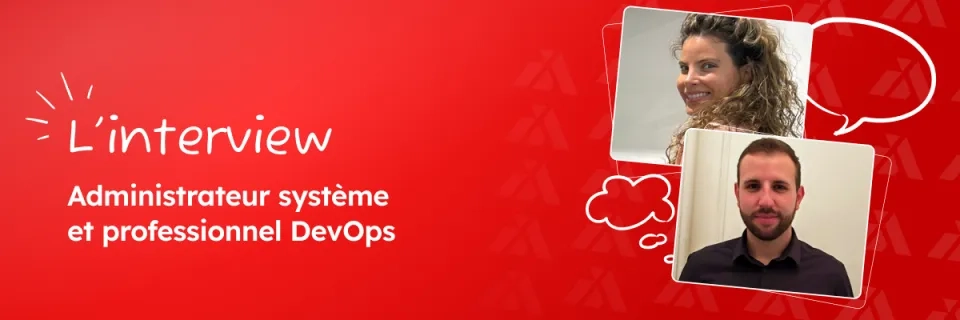Hello Quentin! In the run-up to our interview, I noticed that you have a certain versatility. Can you describe your current role as a system administrator and DevOps professional, and the main responsibilities associated with it?
Hi Alisée, yes, I'll give you some context and then give you a few examples.
I'm currently working for the DSI (Direction des Systèmes d'Information) of the Monegasque government as a system/network & DevOps administrator in the Web Unit of the DMA (Division de la Maintenance Applicative).
I work cross-functionally on different projects, working closely with the RAs (Application Managers) during the industrialisation and configuration phases of the government's websites.
But I'm also in charge of monitoring their deployment and changes when they go live.
I'm a fairly versatile person, as you pointed out, and as a result, my missions revolve around a variety of issues.
I may be involved in development, configuring Linux services, or providing pure network expertise (configuring F5 load balancing equipment, identifying and debugging network accesses), as well as monitoring.
I'm also responsible for an application brick made up of several tools within our production environments. These tools enable developers to store their code, build and deploy websites and their dependencies automatically.
The tools are used to store sensitive site configuration data and to monitor them in real time (monitoring based on metrics, storage, graphs, alerts, etc.). They are also used to scan websites for CVE (Common Vulnerabilities and Exposures) vulnerabilities so that they are compliant before being deployed on the various environments. Finally, I also carry out technical monitoring to keep these tools up to date. All my work is documented, in accordance with government procedures.
When it comes to automating deployment and configuration, you mentioned the use of several tools. How do these technologies fit into your workflow and how do you choose the most appropriate tool for each task?
All our CI (Continuous Integration) work is carried out using the Gitlab CI tool, which comes from our application infrastructure brick.
So I develop the whole build part of the websites and rely on the recommendations of the developers concerning the versioning of dependencies (this guarantees that the tools and libraries used are up to date, compatible and work without error). For the CD (Continuous Deployment/Delivery) part, we currently use two deployment methods on the various environments. The first involves using the Ansible and Docker tools to deploy our infrastructure building blocks. These deployments are triggered manually. We have made this choice in order to control and monitor each stage of deployment precisely. As these components are critical, particular attention is required.
The second method is largely provided by the Semaphore and Rundeck tools, which are made available to the development teams to give them autonomy over website deployment.
However, for the time being, we prefer to carry out the deployments ourselves (the Web Unit team is in charge of this) on the production environments during dedicated weekly MEP (Mise En Production) slots.
The configuration stage is largely carried out using templates coded in Jinja2. The content of these files is variabilised and generated at the time of deployment. The 'secrets' (accounts, passwords, etc.) are stored in the infrastructure brick's Vault tool and retrieved at the appropriate time.
You've given a detailed description of your role and responsibilities, which require a great deal of expertise and adaptability. In this context, what impact has Inforca had on your missions and how has this collaboration contributed to your day-to-day professional development?
Inforca has enabled me to continue my professional career in Monaco. What's more, my work with the Government has been very rewarding and has enabled me to tackle new issues and challenges in the field of IT. As part of certain projects (based on Ibexa architecture), I have to work with Inforca's web development agency. This collaboration is beneficial, both for me and for its talented developers. We regularly have stimulating and constructive technical discussions.
Inforca contributes directly to the development of my skills, particularly in the field of web development.
On a day-to-day basis, I would like to emphasise the availability and attentiveness of the management team when I need them. They have also been very understanding with regard to my personal projects alongside my main professional activity (I am a part-time lecturer at the Université Nice Sophia Antipolis, where I give courses and practical work on computer networks to students). Inforca also enables me to develop professional relationships with the various consultants during the seminars that are organised (always a good time!).
You've highlighted the growing importance of automation in your job. How do you see the role of system administrator/DevOps evolving over the next few years?
In my opinion, the system administrator/DevOps manager must above all be curious and versatile, capable of adapting to all situations.
They need to know how to do (almost) everything, without being experts in every area of IT (Data, AI, Monitoring, Development, Security, etc.). With the rise of automation, administrators will be doing more and more IaC (Infrastructure as Code) development to automate and simplify manual tasks. The aim will be to speed up time-consuming operations and make it easier to deploy applications in different environments. System virtualisation will be at the heart of his or her architecture, so he or she will need to have solid knowledge in this area, as well as of security concepts (zero trust policy, CVE, operating system compliance, pen-testing, CIS best practices, etc.).
The security of information systems is a major issue, particularly in the context of your work for the Monegasque Government. How do you adapt your practices to meet these strict security requirements?
The Government's IS (Information System) policy is very strict when it comes to security. It's a concept that I have to take into account in all my thinking, whether I'm building a new architecture brick or upgrading my projects. Today more than ever, IS security must be at the heart of the administrator's concerns. Not forgetting the availability of the services exposed, measured through the Service Level Agreement / Objective / Indicators: SLA (commitment), SLO (objective), and SLI (measurement). This framework manages and guarantees the quality of digital services and forms a system for monitoring and maintaining service performance.
Interview by A.F, Digital Development and Events Manager at Inforca, with Quentin G, System Administrator and DevOps Professional at Inforca.




